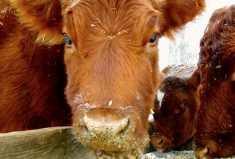Meat packer Olymel plans to restart slaughter operations Thursday at one of Canada’s largest hog plants following a major outbreak of COVID-19 among employees.
Olymel, an arm of Sollio Co-operative, said late Wednesday it had recalled “employees that are needed to ensure that the gradual restarting of operations goes smoothly” at its Red Deer, Alta. hog plant. Slaughter is to resume Thursday and cutting room operations Friday, the company said.
The company said Wednesday it was also recalling employee groups “to take part in training sessions covering all implemented health measures, adjustments and additions made to some of them, and the action plan developed for reopening.”
Read Also

U.S. grains: Soybeans touch 16-month high, wheat firm on Chinese demand hopes
Chicago soybean futures hit 16-month highs on Monday on expectations China will restart large-scale U.S. soy buying after the two countries reached a deal to de-escalate their trade war.
United Food and Commercial Workers (UFCW) Local 401, which represents workers at the Red Deer plant, said Wednesday on Facebook it was “glad to see Olymel reacting to the pressure we’ve been placing on them by cancelling a planned slaughter shift and instead providing the training we called for in our response to the proposed plant reopening.”
Olymel on Feb. 15 declared an indefinite suspension of work at the plant as COVID cases rose among employees, and said conditions were “no longer assembled to continue normal operations in a safe and efficient manner.”
Quoting provincial and union officials, local media on Wednesday reported over 500 cases of COVID-19 are linked to the Olymel plant outbreak, including four deaths. The plant employs about 1,800 people.
Olymel, in its release late Wednesday, said management “is pleased to confirm that most of the employees who have had COVID-19 since the outbreak began have recovered” and offered condolences to families, friends and coworkers of three employees whose deaths were linked to the outbreak.
The company said it “took advantage of the plant closure to update and reinforce the many health and safety measures that were already in place at the plant,” working with a provincial task force that was set up “to support the company in planning a safe gradual reopening.”
Following “full plant inspections by expert teams” from Alberta Health Services (AHS), Occupational Health and Safety (OHS) and Environmental Public Health (EPH) on Monday and Wednesday, AHS “made several recommendations aimed at adjusting and reinforcing certain measures that were already in place and gave the green light to gradually resume operations,” Olymel said.
AHS experts “will be on site when operations resume and will offer rapid testing to anyone who has not tested positive and wishes to be tested,” the company said, noting 1,370 Red Deer employees have been tested since Jan. 1.
However, in a letter Monday to plant management, UFCW 401 president Thomas Hesse said “well over 70 per cent of Olymel employees feel so uncertain about the safety of the plant, that they are prepared to exercise their right to refuse unsafe work.”
That number, he wrote, “is a startling statistic from workers who have been laid off without pay through no fault of their own for going on two weeks.”
Hesse’s letter included a list of “action items” for Olymel to address, including compensation for workers laid off during the shutdown, as well as $4/hour in “pandemic pay premiums” for all employees going forward as long as the pandemic lasts.
The union also called for measures to reduce employee crowding in certain areas, improve ventilation and air quality and stagger start times and break times to help maintain social distancing.
“Please know that unless you can guarantee no one else will become ill and no one else will die, the rushed reopening of Olymel’s Red Deer plant and the resulting consequences will be on your conscience — and yours alone,” Hesse wrote.
‘Precarious position’
The plant’s supply teams, meanwhile, are “in contact with Alberta hog farmers to plan the gradual resumption of deliveries,” Olymel said Wednesday.
Olymel had said in mid-February it expected a backlog of 80,000 to 90,000 hogs from closing the Red Deer plant and planned to ship its company-owned farms’ hogs to U.S. packers to help clear that backlog.
It said Wednesday it “had made the necessary decisions to manage the flow of pigs from its own farms in order to facilitate a return to normal when operations resumed.”
The Red Deer plant has capacity to process about 45,000 hogs per week, out of the company’s total Canadian capacity of about 185,000.
Officials with Alberta Pork had said Feb. 23 that many of its producer members ship hogs to the Olymel plant weekly — and the closure of any processing plant, “even for a short period of time, places producers in a precarious position.”
“Barns are starting to get crowded,” Alberta Pork chair Brent Moen told Alberta Farmer on Monday. “Collectively, we would have marketed probably 100,000 to 110,000 head that are now backed up.”
Affected hog farmers were “adjusting feed levels” to slow their hogs’ growth, while also seeking slaughter space at other plants in both Western Canada and the U.S. for market-ready hogs, Alberta Pork said Feb. 23.
Some producers, the organization said, “are opting to move younger pigs to empty barns in the U.S. to free up space for larger pigs at home.”
Alberta Pork at that time asked producers who normally ship to Olymel to “voluntarily submit any settlement statements and transportation bills” as supporting data for a federal/provincial set-aside program, similar to those set up following COVID-induced cattle and hog slaughter plant shutdowns elsewhere in Canada.
Moen said Monday a program to help offset the costs of keeping market-ready hogs was “under discussion” with provincial officials, “and I believe they are working on a program, but it’s too early to speculate as to what exactly that might be.” — Glacier FarmMedia Network












